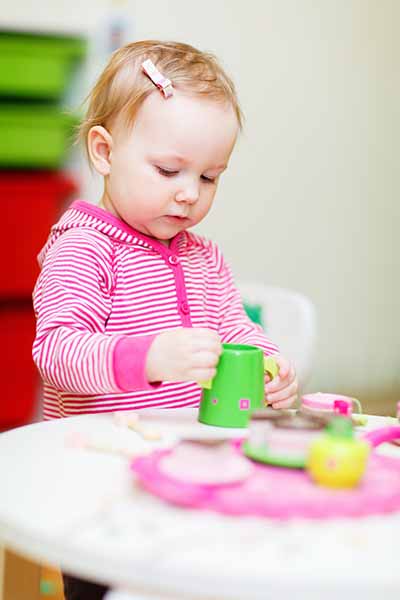Toddler Care
Our toddlers are divided into two age groups – Toddler 1 which is for children aged 20 to 30 months; and Toddler 2 for those aged 30 to 36 months. The curriculum for toddlers focuses on the following areas:
Social-Emotional development
The teachers in our toddler rooms nurture the toddlers along as they learn ways to manage their own feelings. At this stage of development, toddlers begin to follow limits and expectations as teachers guide them through their day. They learn to accept redirection from adults even while becoming more independent and seeking to do things for themselves. Toddlers begin playing near other children and using the same materials as they interact more with their peers than they did as infants. The teachers provide many opportunities for children to play together in small groups and note how the children of this age begin to have preferred playmates. Learning to make friends is a big part of the toddler day – learning to share and take turns.
Physical development
Toddlers begin to experiment with different ways of moving and using their large muscles. They use balancing skills to squat, stand on their tiptoes, kneel and sidestep. Our teachers use movement to music to help children practice these skills. You can often see them dancing with scarves or just moving to the music. Toddlers enjoy throwing and catching large balls. Teachers also plan activities that help toddlers develop their fine motor skills. They begin using their fingers and hands to grasp drawing and writing tools such as crayons, paint brushes, markers, etc. Language development – a toddlers’ speech becomes increasingly complex both in their receptive (listening) and expressive (speaking) language. They can now follow simple verbal requests and directions. The teachers in our toddler rooms help them learn the names of familiar people, animals and objects. Time is spent each day as a small group time of greeting their friends, singing songs with motions, and talking about the plans for the day. As a toddler’s speech develops, they become easier to understand. They use their improved language ability to express their thoughts and needs.
Cognitive development
Toddlers will work on a task for a longer period of time than they did as an infant. Their attention span lengthens and they will stick with a task for longer periods of time. Toddlers observe and imitate how other people solve problems. Our teachers read aloud to the children multiple times each day. This time fosters the lengthening of a child’s attention span. Toddlers seek the teachers’ help when needed and become increasingly curious. They begin to use their imagination in their play as they “act” out routines that they see adults perform. Our teachers get down on the children’s level and play along with the children and use this play time to extend a child’s vocabulary by asking questions or to help them practice sharing with a friend.
Literacy development
Songs and rhymes are a favorite of toddlers. They hum and sing along, sometimes adding the missing words. Our teachers introduce songs and chants help toddlers to develop some pre-reading skills. Older toddlers may learn to recognize and name a few letters, especially those in their name. During story time, toddlers learn how to orient the book correctly and turn the pages. They will learn to recognize their favorite books by the cover.
Mathematic development
Toddlers love to count! They will start out pretending to count objects though not in order. Our teachers use any teachable moment to count such as while washing hands for 20 seconds or bringing four chairs up to the table for snack. As they grow and develop, toddlers will learn to rote count and eventually to count small sets of objects. They will learn and understand the concept of “one”, “two” and “more”. Playing games that require them to follow simple directions related to positions of things in space such as ‘in, on, under, up and down’ are fun for them.


